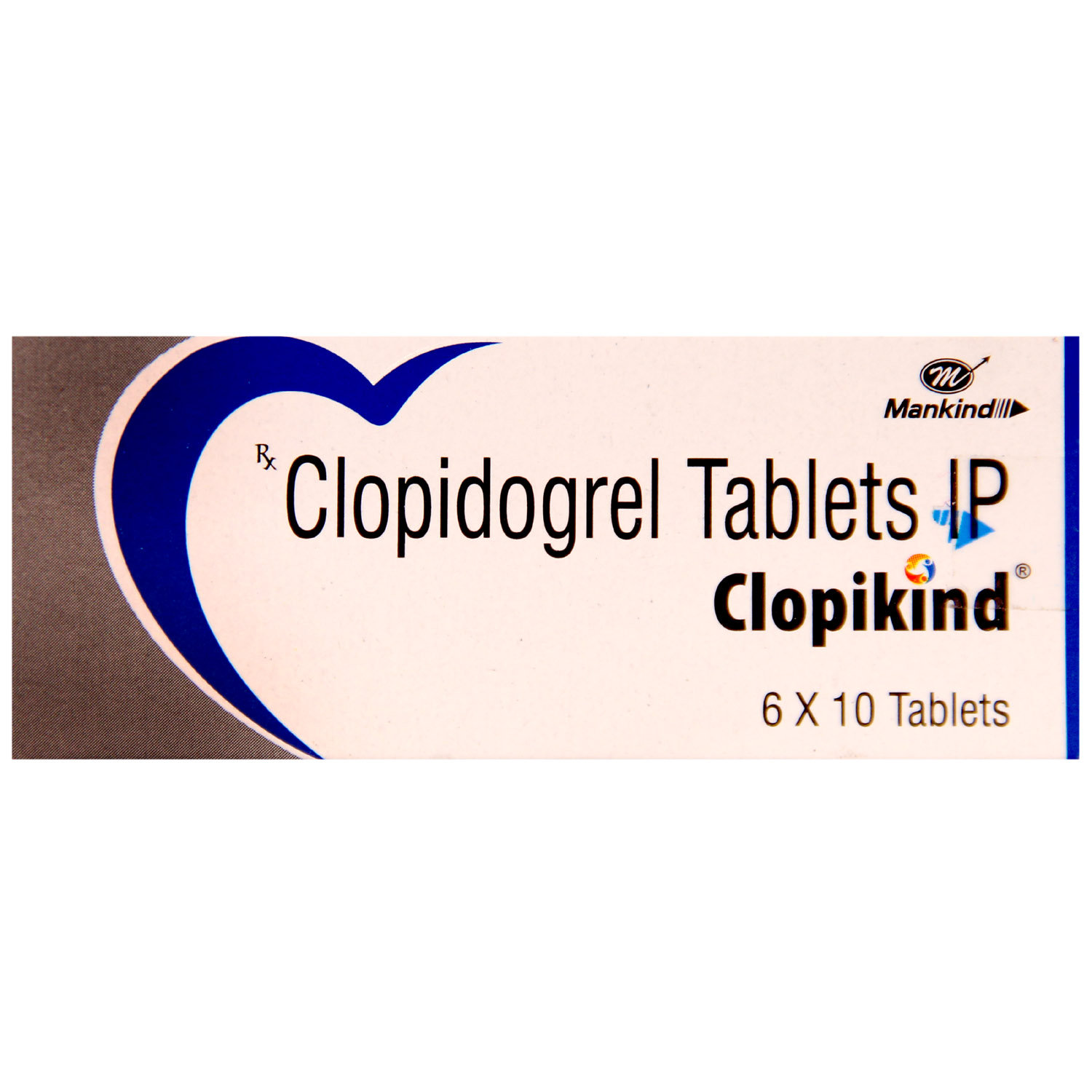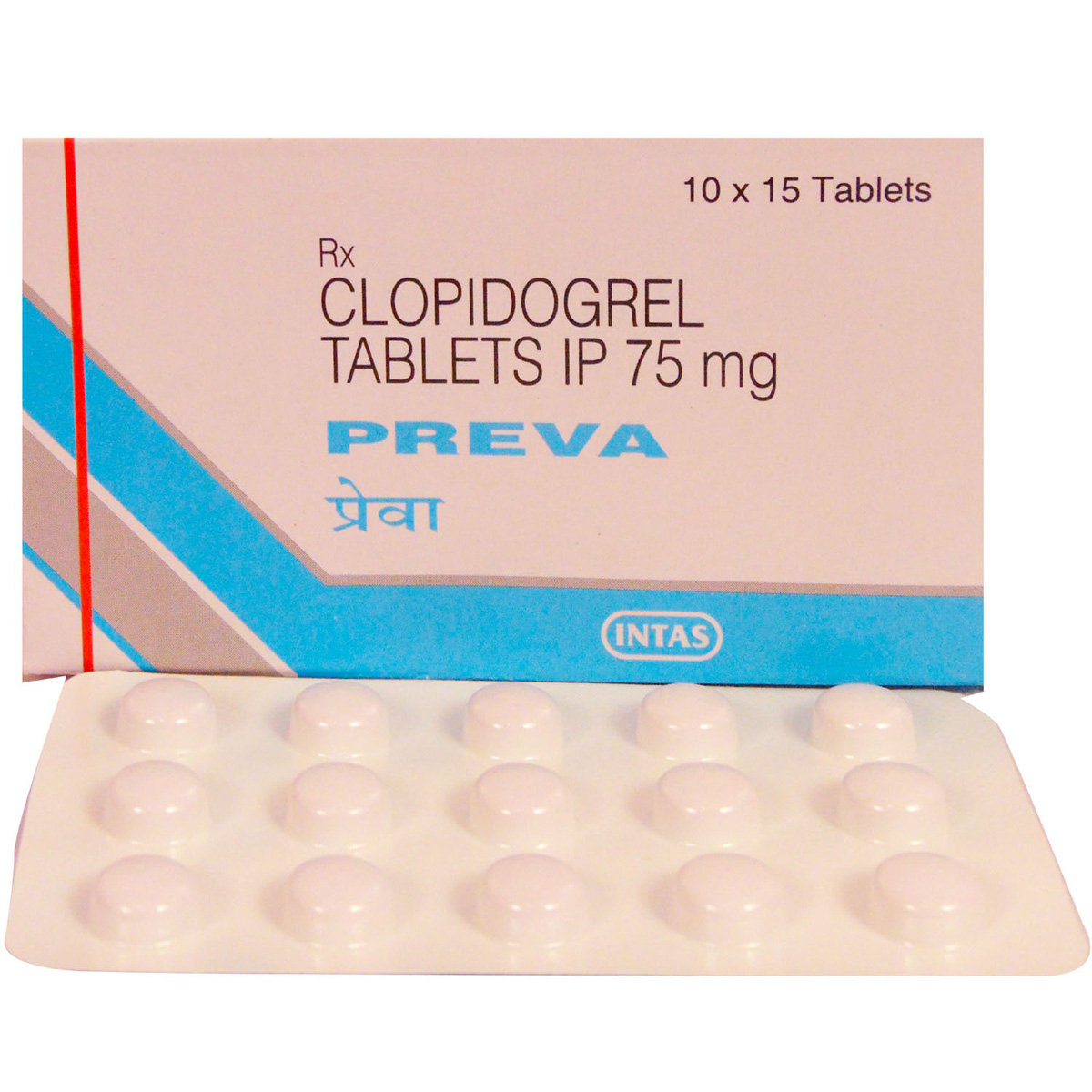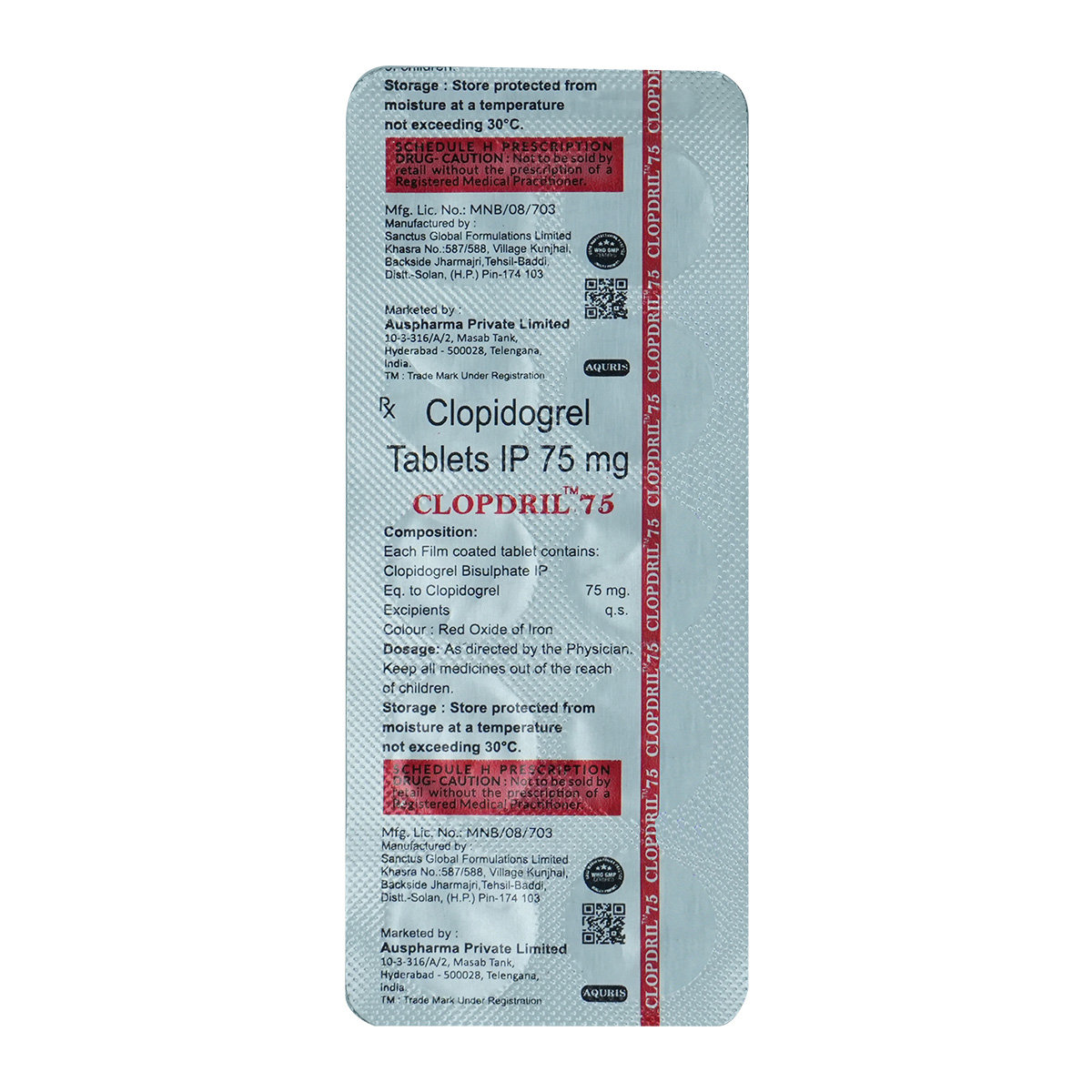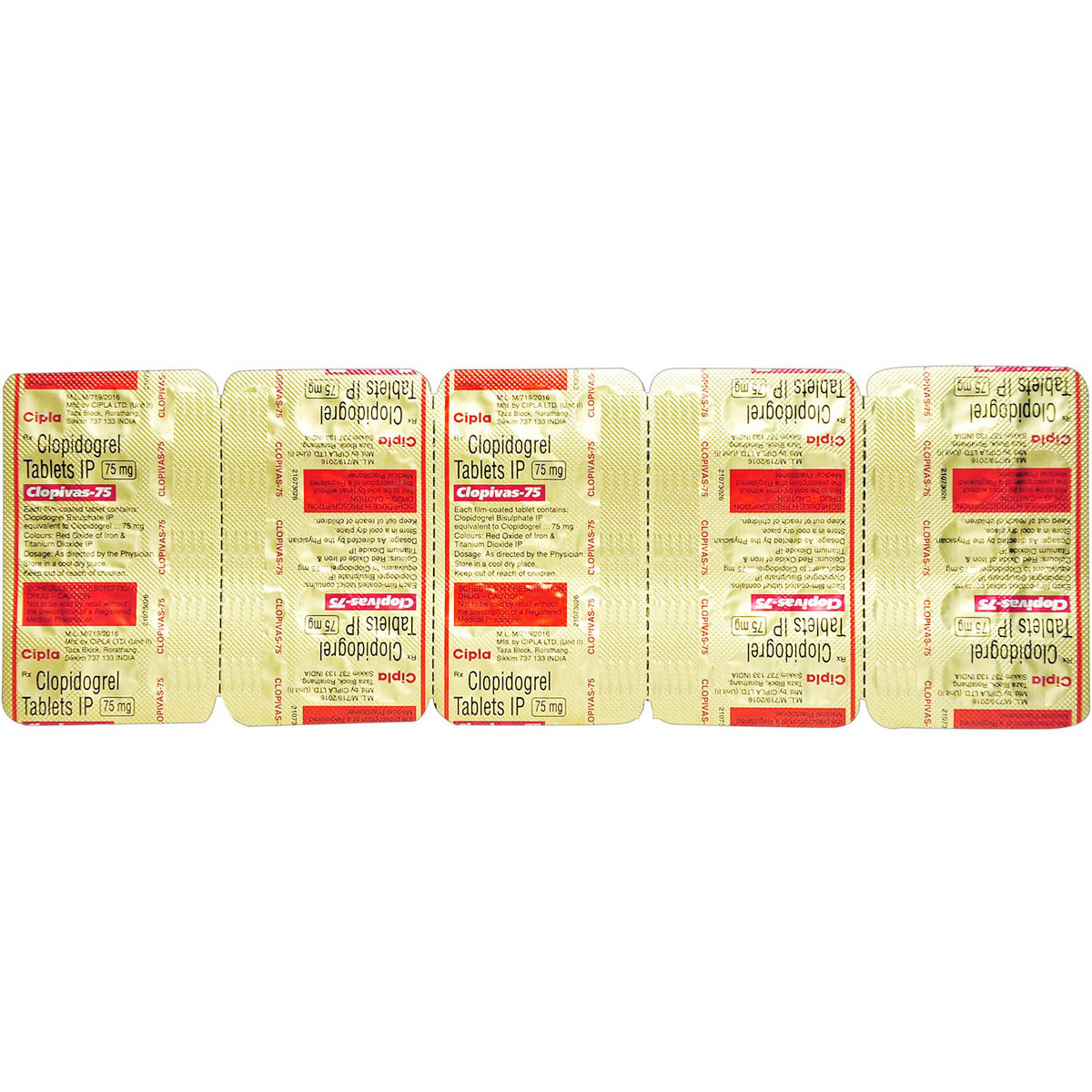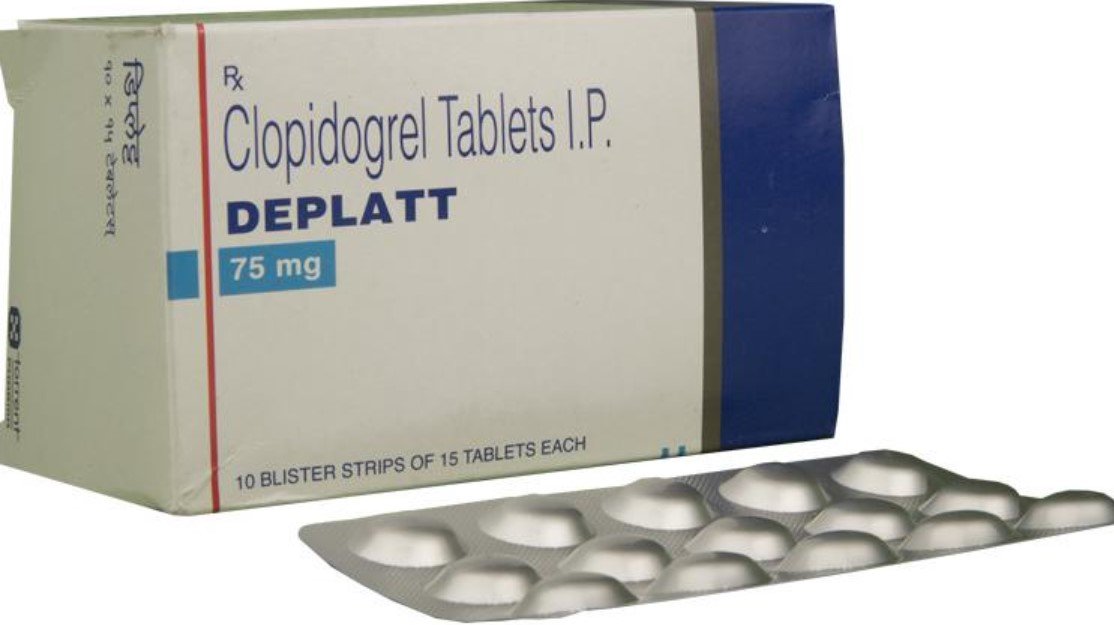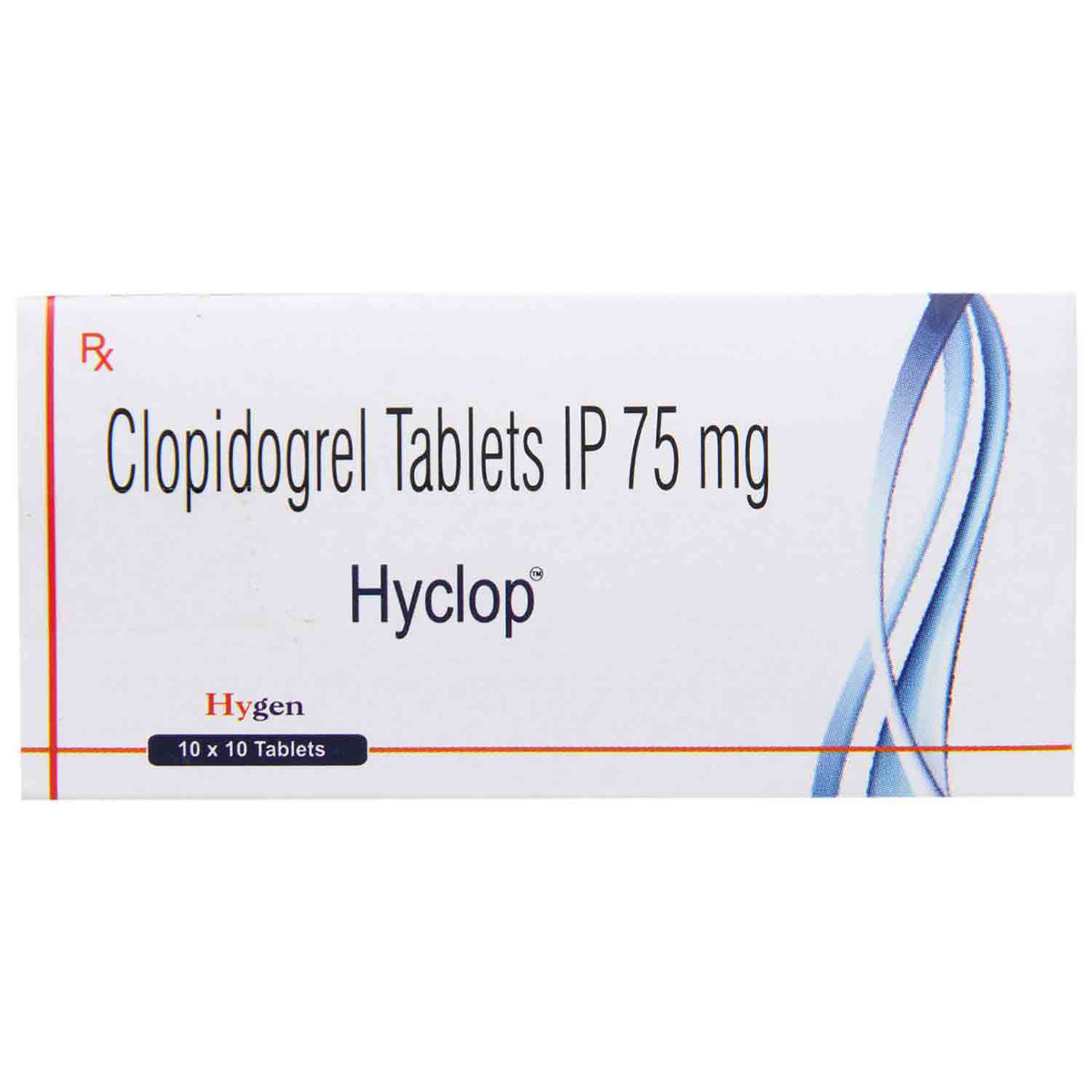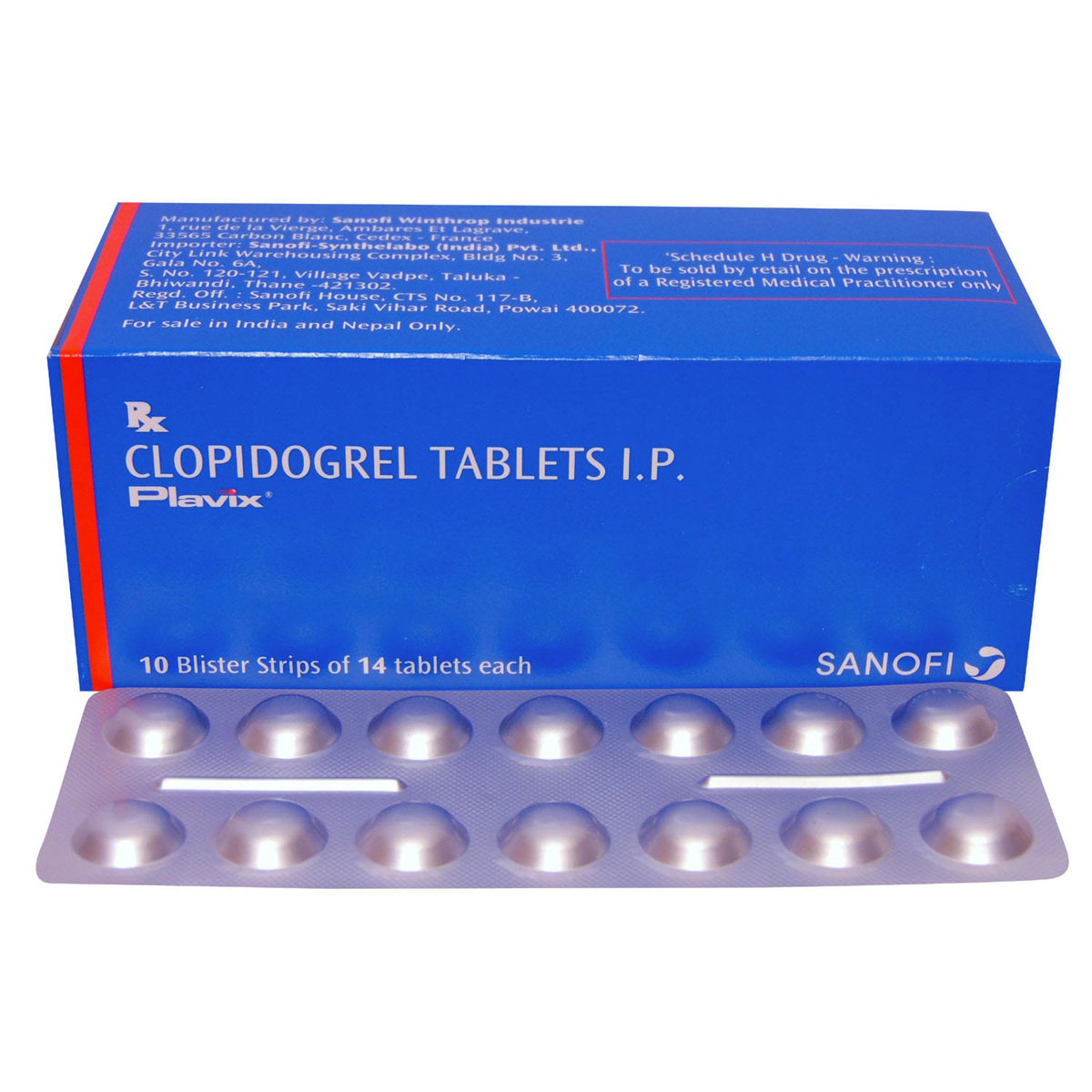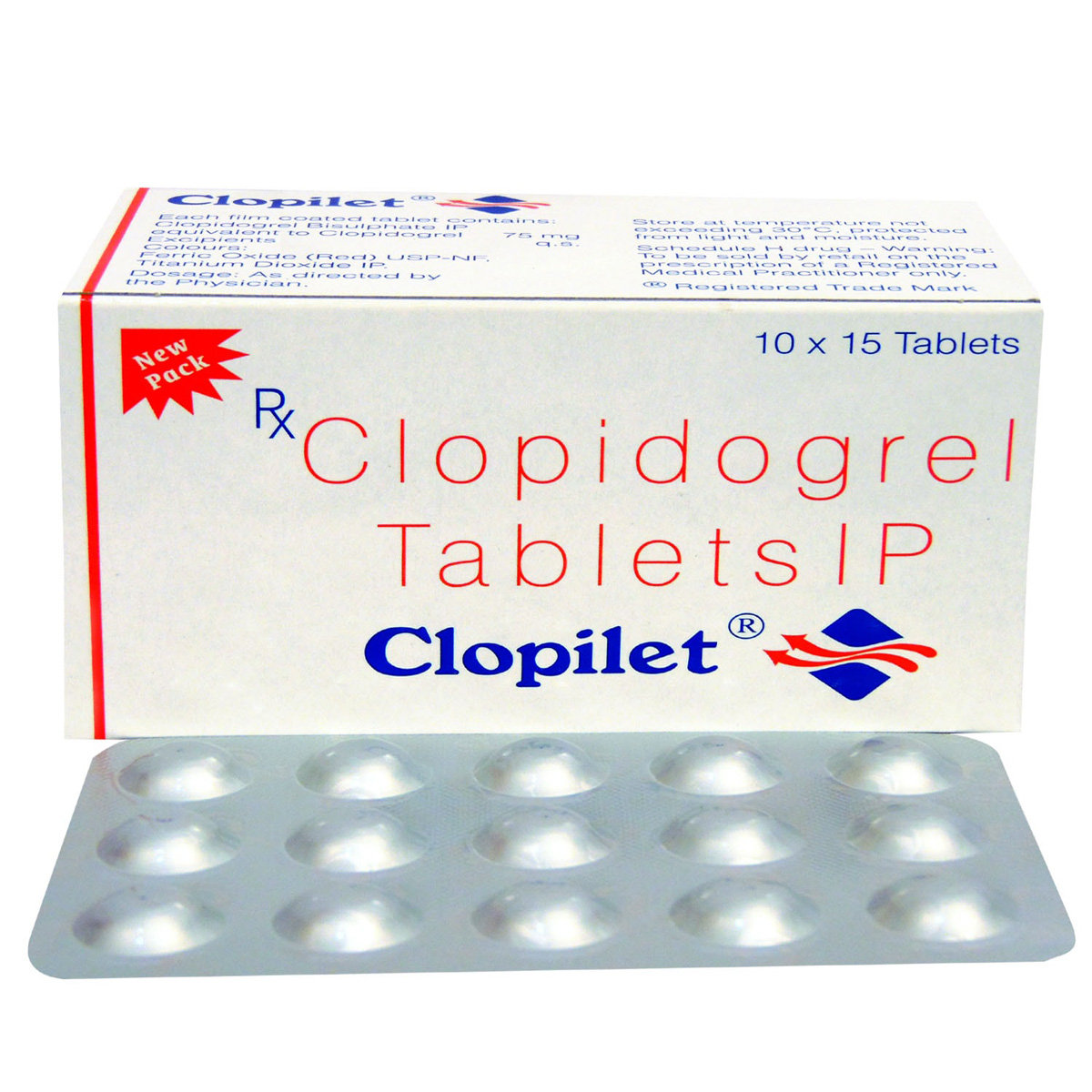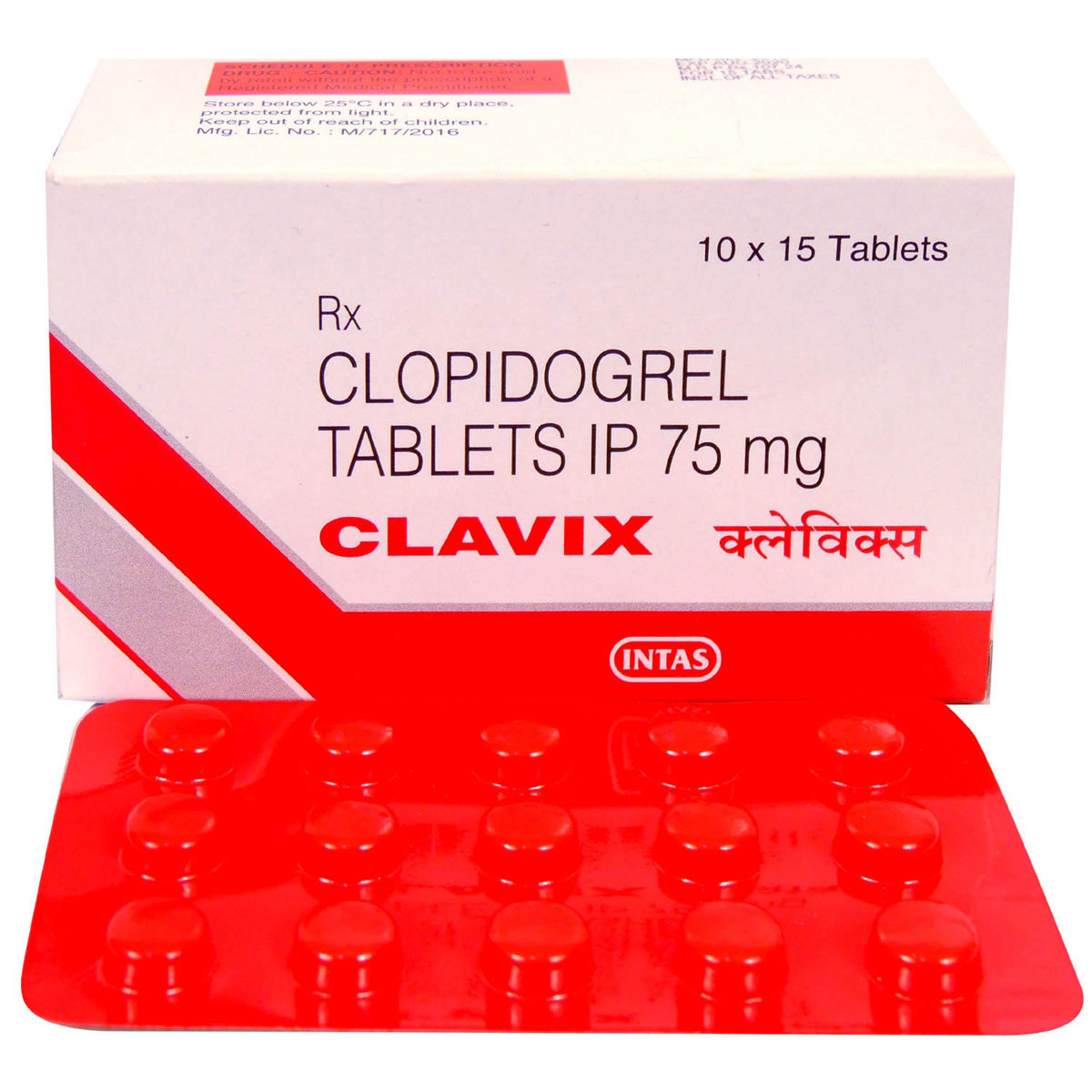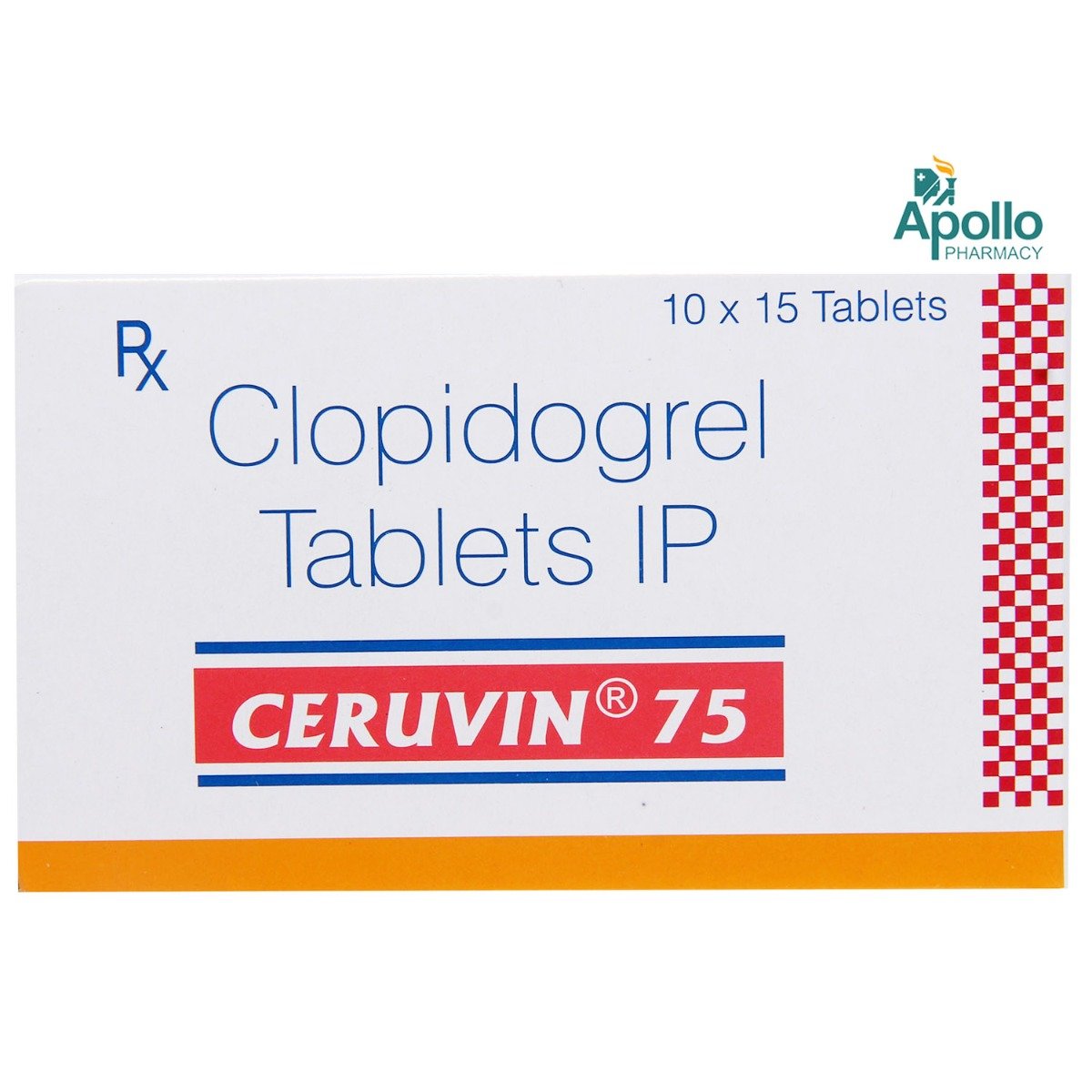Clofre 75 mg Tablet 10's


MRP ₹69.5
(Inclusive of all Taxes)
₹10.4 Cashback (15%)
Provide Delivery Location
Online payment accepted
 Prescription drug
Prescription drugWhats That
Composition :
Manufacturer/Marketer :
Consume Type :
Return Policy :
Expires on or after :
NPPA :
About Clofre 75 mg Tablet
Clofre 75 mg Tablet consists of the anti-platelet drug (blood thinner) primarily taken for the prevention of heart attack or stroke in people at high risk of heart disease. A heart attack generally refers to the blocked flow of blood to the heart because of the blockage of arteries. A heart blockage is most often a build-up of fat, cholesterol and other substances, which form a plaque in the arteries that feed the heart (coronary arteries).
Clofre 75 mg Tablet belongs to a class of medications called a blood thinner or an antiplatelet medication. Clofre 75 mg Tablet plays a vital role in preventing the formation of harmful blood clots (plaque) in your veins. It makes your blood flow easy through your veins making it less likely to form a serious blood clot. So, an intake of Clofre 75 mg Tablet helps prevent blood clots if you have an increased risk of having severe chest pain (unstable angina or heart attack), stroke, peripheral arterial disease (heart problem due to narrowed blood vessels).
The recommended daily dose of Clofre 75 mg Tablet is 75 mg once daily orally, with or without food. It should be swallowed whole with a glass of water. Do not chew, bite or break it. Your doctor will advise you how often you take your tablets based on your medical condition. In some cases, you may experience nosebleeds, heavier periods, bleeding gums, easy bruising, diarrhoea, stomach pain, indigestion, or heartburn. If the side effects are persistent, reach out to your doctor.
Try not to stop taking this medicine of your own. Stopping a sudden intake of Clofre 75 mg Tablet may worsen your condition and increase your risk of cardiovascular death, heart attack, and stroke. Let your doctor know if you have any liver, kidney, or heart problems. Clofre 75 mg Tablet should be taken cautiously in pregnant or breastfeeding women. It should be not given to people with a bleeding disorder (haemophilia), active pathological bleeding, like a peptic ulcer, or bleeding in the brain (intracranial haemorrhage). Do not take Clofre 75 mg Tablet with aspirin or ibuprofen for pain relief while you are using Clofre 75 mg Tablet . It may increase the chance of having stomach ulcers or severe gastric bleeding.
Uses of Clofre 75 mg Tablet
Directions for Use
Medicinal Benefits
Clofre 75 mg Tablet plays a vital role to prevent the formation of harmful blood clots in your blood vessels by making platelets (clotting agents) sticking together. Thus, it helps to reduce the risk of heart attack, stroke, unstable angina (heart related chest pain), peripheral arterial disease (blocked or poor blood flow due to narrowed blood vessels) in heart disease patients and patient who have undergone recent heart surgery with stent.
Storage
- Drink water or other clear fluids.
- To prevent worsening of pain, limit intake of tea, coffee, or alcohol.
- Include bland foods like rice, toast, crackers, and rice in your diet.
- Avoid lying down immediately after eating as it may cause indigestion or heartburn.
- Avoid acidic and spicy food as it may cause indigestion.
- Take medications with food (if recommended): It can help prevent stomach distress and indigestion.
- Eat smaller, more frequent meals: Divide daily food intake into smaller, more frequent meals to ease digestion.
- Avoid trigger foods: Identify and avoid foods that trigger indigestion, such as spicy, fatty, or acidic foods.
- Stay upright after eating: Sit or stand upright for at least 1-2 hours after eating to prevent stomach acid from flowing into the oesophagus.
- Avoid carbonated drinks: Avoid drinking carbonated beverages, such as soda or beer, which can worsen indigestion.
- Manage stress: To alleviate indigestion, engage in stress-reducing activities like deep breathing exercises or meditation.
- Consult a doctor if needed: If indigestion worsens or persists, consult a healthcare professional to adjust the medication regimen or explore alternative treatments.
- Inform Your Doctor: Notify your doctor immediately about your diarrhoea symptoms. This allows them to adjust your medication or provide guidance on managing side effects.
- Stay Hydrated: Drink plenty of fluids to replace lost water and electrolytes. Choose water, clear broth, and electrolyte-rich drinks. Avoid carbonated or caffeinated beverages to effectively rehydrate your body.
- Follow a Bland Diet: Eat easy-to-digest foods to help firm up your stool and settle your stomach. Try incorporating bananas, rice, applesauce, toast, plain crackers, and boiled vegetables into your diet.
- Avoid Trigger Foods: Steer clear of foods that can worsen diarrhoea, such as spicy, fatty, or greasy foods, high-fibre foods, and dairy products (especially if you're lactose intolerant).
- Practice Good Hygiene: Maintain good hygiene to prevent the spread of infection. To stay healthy, wash your hands frequently, clean and disinfect surfaces regularly, and avoid exchanging personal belongings with others.
- Take Anti-Diarrheal Medications: If your doctor advises, anti-diarrheal medications such as loperamide might help manage diarrhoea symptoms. Always follow your doctor's directions.
- Keep track of your diarrhoea symptoms. If they don't get better or worse or are accompanied by severe stomach pain, blood, or dehydration signs (like extreme thirst or dark urine), seek medical help.
- Inform your doctor about the nausea and discuss possible alternatives to the medication or adjustments to the dosage.
- Divide your daily food intake into smaller, more frequent meals to reduce nausea.
- Opt for bland, easily digestible foods like crackers, toast, plain rice, bananas, and applesauce.
- Avoid certain foods that can trigger nausea, such as fatty, greasy, spicy, and smelly foods.
- Drink plenty of fluids, such as water, clear broth, or electrolyte-rich beverages like coconut water or sports drinks.
- Use ginger (tea, ale, or candies) to help relieve nausea.
- Get adequate rest and also avoid strenuous activities that can worsen nausea.
- Talk to your doctor about taking anti-nausea medication if your nausea is severe.
- Record when your nausea occurs, what triggers it, and what provides relief to help you identify patterns and manage your symptoms more effectively.
- Chest pain may last for a while and needs immediate medical attention as it is a significant health issue to be attended to.
- Take rest and refrain from doing physical activity for a while, and restart after a few days.
- Try applying an ice pack to the strained area for at least 20 minutes thrice a day. Ice pack thus helps reduce inflammation.
- Sit upright and maintain proper posture if there is persistent chest pain. • Use extra pillows to elevate your position and prop your chest up while sleeping.
Drug Warnings
Indigestion medicines known as proton pump inhibitors like omeprazole should be used with caution while taking Clofre 75 mg Tablet . Prolonged use of Clofre 75 mg Tablet can cause bleeding problems (like nosebleeds, heavier periods, bleeding gums, and easy bruising). If you are going to have any surgery, discontinue taking Clofre 75 mg Tablet 5 days before the surgery. Discontinuation of Clofre 75 mg Tablet might increase the risk of heart attack, stroke, and other risks of cardiovascular events. So, do not stop taking Clofre 75 mg Tablet of a sudden on your own decision. If you have had any recent stroke or heart attack, stop the intake of Clofre 75 mg Tablet with painkillers like aspirin or ibuprofen as it can increase your stomach or gastrointestinal bleeding. Purpura (blood leakage under the skin) has been observed with the use of Clofre 75 mg Tablet including in fatal cases.
Drug-Drug Interactions
Drug-Drug Interactions
Login/Sign Up
Taking Clofre 75 mg Tablet together with mifepristone increases the risk of vaginal bleeding in women.
How to manage the interaction:
Although taking Clofre 75 mg Tablet with mifepristone is not recommended, that would certainly result in interaction, it can be taken if a doctor prescribes it. If you experience prolonged and heavy bleeding, consult a doctor immediately. Do not discontinue any medication without consulting a doctor.
When Selexipag and Clofre 75 mg Tablet are taken together, the body's ability to break down Selexipag may be reduced.
How to manage the interaction:
Taking Clofre 75 mg Tablet with Selexipag is not recommended, please consult your doctor before taking it. They can be taken if prescribed by your doctor.
Using desirudin together with Clofre 75 mg Tablet may increase the risk of bleeding.
How to manage the interaction:
Taking Clofre 75 mg Tablet with Desirudin together can result in an interaction, but it can be taken if your doctor has advised it. However, consult a doctor if you experience difficulty with bleeding, bleeding, bruising, feeling dizzy or lightheaded, dark or sticky stools, headache, or vomiting. Do not stop using any medications without a doctor's advice.
Taking loperamide with Clofre 75 mg Tablet may significantly increase the blood levels of loperamide. This can lead to serious and complications such as irregular heart rhythm.
How to manage the interaction:
Although talking Clofre 75 mg Tablet with loperamide may result in an interaction, it can be taken together if prescribed by a doctor. However, consult a doctor if you experience sudden dizziness, lightheadedness, or shortness of breath. Do not discontinue any medications without consulting a doctor.
Taking Clofre 75 mg Tablet with acalabrutinib may increase the risk of bleeding.
How to manage the interaction:
There could be a possible interaction between Clofre 75 mg Tablet and Acalabrutinib, but they can be taken together if your doctor has prescribed them. However, consult your doctor immediately if you experience any unusual bleeding or have other signs of bleeding, like feeling dizzy or lightheaded, red or black, sticky stools, or severe headaches. Do not discontinue any medication without consulting your doctor.
Taking rosuvastatin with Clofre 75 mg Tablet can increase the blood levels of rosuvastatin. This can increase the risk of side effects.
How to manage the interaction:
Although taking Clofre 75 mg Tablet together with Rosuvastatin may result in an interaction, it can be taken if prescribed by your doctor. However, consult your doctor immediately if you experience chills, joint pain or swelling, skin rash, itching, nausea, vomiting, dark-colored urine, and/or yellowing of the skin or eyes. Do not discontinue any medication without consulting your doctor.
Taking enoxaparin with Clofre 75 mg Tablet can increase the risk of bleeding.
How to manage the interaction:
There may be a possibility of interaction between Clofre 75 mg Tablet and Enoxaparin, but they can be taken together if prescribed by a doctor. However, If you experience any unusual bleeding or have other signs of bleeding like feeling dizzy or lightheaded, red or black, sticky stools, or headache, consult a doctor immediately. Do not discontinue any medication without consulting a doctor.
Taking Clofre 75 mg Tablet with ticlopidine can reduced effectiveness of Clofre 75 mg Tablet.
How to manage the interaction:
Taking Clofre 75 mg Tablet and Ticlopidine together possibly has an interaction, but you can take these medications together if your doctor has advised it. Do not stop using any medications without talking to your doctor.
Taking Clofre 75 mg Tablet with Dabigatran may increase the risk of bleeding.
How to manage the interaction:
Although there may be an interaction between Clofre 75 mg Tablet and Apixaban, they can be taken together if advised by your doctor. However, consult your doctor immediately if you experience any unusual bleeding, dizziness or lightheadedness, red or black, sticky stools, or headaches. Do not discontinue any medication without consulting your doctor.
Co-administration of Clofre 75 mg Tablet with fluconazole can reduce the effectiveness of Clofre 75 mg Tablet.
How to manage the interaction:
Clofre 75 mg Tablet and Fluconazole may interact, but you can take these medications together if a doctor has advised it. Do not stop using any medications without talking to your doctor.
Drug-Food Interactions
Drug-Food Interactions
Login/Sign Up
Diet & Lifestyle Advise
- A low cholesterol diet and a regular exercise regime complement treatment with Clofre 75 mg Tablet effectively.
- Stick to a freshly prepared home-cooked meal and avoid processed, packed foods that contain hidden sugar and extra calories.
- Try to replace most of your saturated fats with unsaturated fats can reduce total cholesterol and LDL cholesterol (bad cholesterol) in a short period.
- Foods like avocados, olive oil, fatty fish and nuts contain many heart-healthy unsaturated fats, so eating them regularly is beneficial.
- Include a diet enriched in fats like fish oils, polyunsaturated oils, and omega-3 fatty acids, which are good for heart health.
- Quit smoking and avoid excessive intake of alcohol.
Side Effects of Clofre 75 mg Tablet
- Nosebleeds
- Heavier periods
- Bleeding gums
- Easy bruising
- Diarrhoea
- Stomach pain
- Indigestion or heartburn
Habit Forming
Therapeutic Class
All Substitutes & Brand Comparisons
RX
Clopikind Tablet 10's
Mankind Pharma Pvt Ltd
₹31
(₹2.79 per unit)
55% CHEAPERRX
Preva 75 Tablet 15's
Intas Pharmaceuticals Ltd
₹85.5
(₹5.13 per unit)
18% CHEAPERRX
Clopdril 75 Tablet 10'S
Auspharma Pvt Ltd
₹62
(₹5.59 per unit)
10% CHEAPER
Product Substitutes
Author Details
We provide you with authentic, trustworthy and relevant information
Drug-Diseases Interactions
Drug-Diseases Interactions
Login/Sign Up
FAQs
Drug-Drug Interactions Checker List
- WARFARIN
- ASPIRIN
- RIVAROXABAN
- APIXABAN
- IBUPROFEN
- CITALOPRAM
- OMEPRAZOLE
Special Advise
- As Clofre 75 mg Tablet tends to increase bleeding, try to avoid injuries, keep away from sharp objects, and inform your doctor if you have peptic ulcers or injuries.
Disease/Condition Glossary
A blood clot can occur in any part of the body that can lead to a heart attack, stroke, and damage to organs (even coma or death). Blood clots can reach your arteries or veins in the organs like the brain, kidney, heart, lungs, and limbs. Conditions like atherosclerosis, diabetes, heart failure, irregular heartbeat (arrhythmia), and obesity/overweight can trigger excessive blood clotting in the brain and heart. On the other hand, deep vein thrombosis (blood clot in veins), peripheral artery disease (narrowed arteries due to fat deposit or blood clot), and atherosclerosis (fat build upon the walls of the arteries) can cause a blood clot in your limbs.

Have a query?
Buy best Cardiology products by
Torrent Pharmaceuticals Ltd
Sun Pharmaceutical Industries Ltd
Lupin Ltd
Intas Pharmaceuticals Ltd
Cipla Ltd
Micro Labs Ltd
Macleods Pharmaceuticals Ltd
Abbott India Ltd
Ajanta Pharma Ltd
Ipca Laboratories Ltd
Eris Life Sciences Ltd
Mankind Pharma Pvt Ltd
Lloyd Healthcare Pvt Ltd
Dr Reddy's Laboratories Ltd
Glenmark Pharmaceuticals Ltd
Emcure Pharmaceuticals Ltd
Alembic Pharmaceuticals Ltd
Alkem Laboratories Ltd
East West Pharma India Pvt Ltd
USV Pvt Ltd
Zydus Healthcare Ltd
Aristo Pharmaceuticals Pvt Ltd
Elbrit Life Sciences Pvt Ltd
J B Chemicals & Pharmaceuticals Ltd
Zydus Cadila
Akumentis Healthcare Ltd
Alteus Biogenics Pvt Ltd
Hbc Life Sciences Pvt Ltd
Fusion Health Care Pvt Ltd
Troikaa Pharmaceuticals Ltd
La Renon Healthcare Pvt Ltd
Corona Remedies Pvt Ltd
Jubilant Lifesciences Ltd
Medley Pharmaceuticals Ltd
Knoll Healthcare Pvt Ltd
Msn Laboratories Pvt Ltd
Zuventus Healthcare Ltd
Cadila Pharmaceuticals Ltd
Blue Cross Laboratories Pvt Ltd
Lividus Pharmaceuticals Pvt Ltd
Morepen Laboratories Ltd
Ranmarc Labs
Shrrishti Health Care Products Pvt Ltd
Sanofi India Ltd
Steris Healthcare
Elder Pharmaceuticals Ltd
Primus Remedies Pvt Ltd
Unison Pharmaceuticals Pvt Ltd
Eswar Therapeutics Pvt Ltd
Knoll Pharmaceuticals Ltd
Tas Med India Pvt Ltd
Systopic Laboratories Pvt Ltd
Indiabulls Pharmaceuticals Pvt Ltd
Leeford Healthcare Ltd
Sinsan Pharmaceuticals Pvt Ltd
Biochem Pharmaceutical Industries Ltd
Cadila Healthcare Ltd
Azkka Pharmaceuticals Pvt Ltd
Nirvana India Pvt Ltd
Orsim Pharma
Prevego Healthcare & Research Pvt Ltd
Econ Healthcare
Elinor Pharmaceuticals (P) Ltd
FDC Ltd
Sunij Pharma Pvt Ltd
Nicholas Piramal India Ltd
Astra Zeneca Pharma India Ltd
Pfizer Ltd
Lia Life Sciences Pvt Ltd
Shine Pharmaceuticals Ltd
Elicad Pharmaceuticals Pvt Ltd
Indoco Remedies Ltd
Proqol Health Care Pvt Ltd
Vasu Organics Pvt Ltd
Biocon Ltd
Opsis Care Lifesciences Pvt Ltd
Johnlee Pharmaceuticals Pvt Ltd
Merck Ltd
Wockhardt Ltd
Auspharma Pvt Ltd
Ergos Life Sciences Pvt Ltd
Lakshya Life Sciences Pvt Ltd
Ordain Health Care Global Pvt Ltd
Pficus De Med Pvt Ltd
ALICAN PHARMACEUTICAL PVT LTD
RPG Life Sciences Ltd
Glynis Pharmaceuticals Pvt Ltd
Orris Pharmaceuticals
Samarth Life Sciences Pvt Ltd
Aprica Pharmaceuticals Pvt Ltd
Aretaeus Pharmaceuticals Pvt Ltd
Koye Pharmaceuticals Pvt Ltd
Neocardiab Care
Retra Life Science Pvt Ltd
Alniche Life Sciences Pvt Ltd
Alvio Pharmaceuticals Pvt Ltd
Arkas Pharma Pvt Ltd
Atos Lifesciences Pvt Ltd
Divine Savior Pvt Ltd
Metalis Lifesciences Pvt Ltd
Alcohol
Caution
You can drink alcohol with Clofre 75 mg Tablet . But do not drink too much while taking this medicine. It can irritate your stomach.
Pregnancy
Caution
Clofre 75 mg Tablet should not be taken until prescribed. Your doctor will weigh the benefits and any potential risks before prescribing it to you. Please consult your doctor.
Breast Feeding
Caution
Clofre 75 mg Tablet should not be taken until prescribed. Your doctor will weigh the benefits and any potential risks before prescribing it to you. Please consult your doctor.
Driving
Safe if prescribed
Clofre 75 mg Tablet has no or negligible influence on the ability to drive or use machines.
Liver
Safe if prescribed
No dosage adjustment is necessary in patients with liver disease.
Kidney
Caution
Clofre 75 mg Tablet to be taken with caution, especially if you have a history of Kidney diseases/conditions. The dose may have to be adjusted by your doctor.
Children
Unsafe
Clofre 75 mg Tablet is not recommended for children. The safety and effectiveness of Clofre 75 mg Tablet have not been established in children due to limited testing of this drug on children by competent authorities across the world.
Recommended for a 30-day course: 3 Strips


